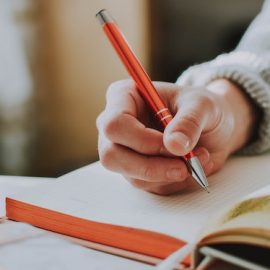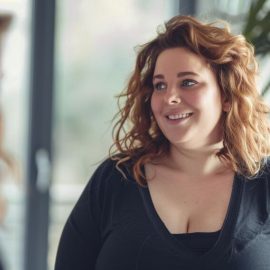

This article gives you a glimpse of what you can learn with Shortform. Shortform has the world’s best guides to 1000+ nonfiction books, plus other resources to help you accelerate your learning.
Want to learn faster and get smarter? Sign up for a free trial here .
Why are we afraid of the unknown? How does your fear of uncertainty prevent you from growing and seizing opportunities that life presents?
Changing your life sometimes requires a leap of faith. Maybe parts of your life are no longer fulfilling, or your current circumstances are no longer meeting your needs. To start down a different path, you have to overcome the fear of uncertainty and trust that everything will work out.
Here’s why we’re so terrified of uncertainty and how you can empower yourself to step confidently into the unknown despite your fears.
Why Do We Fear Uncertainty?
According to Rolf Dobell, the author of The Art of Thinking Clearly, humans are predisposed to dislike uncertainty because the fear of uncertainty confers a survival advantage. For early humans, lacking facts was deadly: If you didn’t know which plants were edible or where predators lived, you died. Thus, humans evolved to avoid uncertainty.
However, uncertainty is very prevalent and thus unavoidable in modern society. While the ideal approach to this rampant uncertainty would be to learn to accept and work with it, Dobelli argues, this is near impossible: Your tolerance for uncertainty is pre-determined by how your amygdala, which processes emotions, forms.
| In Emotional Intelligence, Daniel Goleman argues that people fall on a range of how much uncertainty they can tolerate. Some people are naturally bold and can comfortably tolerate more uncertainty than people who are naturally timid. However, others argue that you can increase resilience through “flooding,” during which you expose yourself to increasing amounts of uncertainty. After the initial exposure period, your brain becomes bored with the uncertainty and accepts it. |
TITLE: The Art of Thinking Clearly
AUTHOR: Rolf Dobelli
TIME: 61
READS: 69.8
IMG_URL: https://www.shortform.com/blog/wp-content/uploads/2022/02/the-art-of-thinking-clearly-cover.png
BOOK_SUMMARYURL: the-art-of-thinking-clearly-summary-rolf-dobelli
AMZN_ID: XYZ
The Negative Consequences of the Fear of Uncertainty
Although the fear of uncertainty has helped the human species survive in primitive times, it’s less useful in the modern day. In fact, it often does more harm than good.
Fear of Uncertainty Causes Stagnation
Fearing uncertainty can cause stagnation: Even if your situation is bad, you’d rather stay in that situation than face the uncertainty of leaving. However, to move forward, you’ll eventually have to accept uncertainty and have faith that your choice will work out. You can’t predict the future, so deliberating about a decision for a long time won’t help.
Maybe you’ve always wanted to quit your desk job to run your own business, or you’ve always wanted to live in another country. You may or may not succeed, but you should do it anyway. Simple, everyday existence brings many risks, so it’s pointless to always prioritize safety. Sometimes you need to sacrifice your security so you can evolve and grow.
Fear of Uncertainty Blocks Your Intuition
Intuition is personal insight commonly described as a “gut instinct.” This feeling develops through experience and helps shape your perspective on the world. Intuition is directly tied to authenticity as it represents your subconscious response to the world around you.
According to Brené Brown, the author of The Power of Vulnerability, fear of uncertainty blocks your intuition. To start listening to your intuition, you must first accept that certainty isn’t real. The world is constantly changing, and no one can predict the future. Learning to sit with uncertainty and allowing your instincts to guide your decision-making process often leads to clarity and fulfillment.
Faith is an important aspect of embracing uncertainty. It gives you the courage to walk into the unknown while believing in something greater than yourself.
TITLE: The Power Of Vulnerability
AUTHOR: Brené Brown
TIME: 28
READS: 77.6
IMG_URL: https://www.shortform.com/blog/wp-content/uploads/2021/05/the-power-of-vulnerability-cover.png
BOOK_SUMMARYURL: the-power-of-vulnerability-summary-brené-brown
AMZN_ID: XYZ
Embrace Uncertainty
Now that you understand why you should embrace uncertainty, how do you actually do in practice? In Think Like a Rocket Scientist, Ozan Varol offers two ways to embrace uncertainty in order to make big leaps:
Nail Down What You Do and Don’t Know for Sure
Contain your fear of uncertainty by listing exactly what you know about a problem or situation. Whatever’s left is the real uncertainty, which is probably smaller than it looked before delineating. Then, ask yourself: What’s the worst-case scenario? What’s the best? How likely are they?
For example, imagine you want to start selling a new type of product. The things you know might include the specifications of the product, how much that product will cost to manufacture, the price you want to give the product, and the fact that your competitors’ equivalent product is successful. An uncertainty that remains is the demand for your version of the product.
In the worst-case scenario, nobody would want to buy your product; in the best case, the product would be a roaring success. On balance, the most realistic scenario is moderate success; since people buy your competitor’s offering, there’s clearly some demand for that type of product. However, roaring success is unlikely, at least immediately, if your competitor has got a hold on the market. Ultimately, there’s still some uncertainty regarding the success of your product, but at least you’ve got a rough idea of how launching it may pan out.
Add a Degree of Redundancy to the Important Parts of Your Life
Redundancy is a safety measure—a backup to make sure things work out okay even if Plan A goes wrong (for example, it’s wise to back up all of your digital information in case something happens to your computer).
However, redundancy only helps up to a point, and too much redundancy can introduce a dangerous amount of complexity to a system.
| Reduce Uncertainty the Fermi Way Nailing down what you do and don’t know for sure is similar to the process of solving Fermi problems. Fermi problems are a specific type of thought experiment popularized by physicist Enrico Fermi in which you attempt to estimate an unknown quantity without any additional information (for example, “How many piano tuners are there in New York City?”). In Superforecasting, psychologist Philip Tetlock argues that the best approach to solving Fermi problems is to break the question down into smaller and smaller questions, then decide which of those small questions you can answer and which you can’t. This process reduces the overall uncertainty of the original question down to a few smaller, manageable uncertainties for which you can make educated guesses. |
TITLE: Think Like a Rocket Scientist
AUTHOR: Ozan Varol
TIME: 17
READS: 71.3
IMG_URL: https://www.shortform.com/blog/wp-content/uploads/2021/09/think-like-a-rocket-scientist-cover.png
BOOK_SUMMARYURL: think-like-a-rocket-scientist-summary-ozan-varol
AMZN_ID: XYZ
Overcoming the Fear of Uncertainty in Decision-Making
In her book Thinking in Bets, Annie Duke compares decisions in the face of uncertainty to betting. In a bet, you know that even if the odds are in your favor, there’s a chance you could lose. Betting means knowing you don’t have all the information; you have to use your best judgment in the face of risk and uncertainty.
Decisions are the same; to deal with uncertainty, you weigh the odds and hope for the best outcome. In the ideal decision-making process, you evaluate your choices and pick the option with the highest chance of success.
However, it can be difficult to build a habit of self-evaluating a positive outcome because research shows that failure carries more weight for us than success. We feel the sting of a loss more strongly than the high of a victory. That’s why you’re better off freeing yourself from the concept of winning or losing altogether, when possible, and embracing the fact that most decisions and outcomes fall somewhere in between. And if all the choices available to you carry a degree of uncertainty, a chance of failure, you can learn to evaluate which one is the least likely to fail.
You do this mental math every time you choose between two different jobs, two different homes, two different strategies in a poker game. Each option carries the chance that something will go wrong; you pick the choice you think will turn out the best, even though you can’t be sure.
For example, maybe you choose the better-paying job out of two options. After weighing the pros and cons, you determined that being able to save up for your long-term goals was a priority. You’re aware that the hours will be longer and the responsibilities heavier, but that’s a trade-off you’re prepared for. You’re not guaranteed to succeed at the job or enjoy it. There’s a chance you’ll wind up hating the company culture and leaving in a few months, or that you’ll get fired. But you can’t know that will happen until you’ve tried. All you can do is pick the choice that you think is more likely to work out for you.
TITLE: Thinking in Bets
AUTHOR: Annie Duke
TIME: 25
READS: 127.1
IMG_URL: https://www.shortform.com/blog/wp-content/uploads/2021/05/thinking-in-bets-cover.png
BOOK_SUMMARYURL: thinking-in-bets-summary-annie-duke
AMZN_ID: XYZ
Final Words
Embracing uncertainty is difficult because humans are biologically programmed to resist it. For our earliest human ancestors, uncertainty could be a death sentence. At the same time, without embracing the unknown, progress is impossible. That’s why to evolve and grow, you have to learn to be comfortable with uncertainty.
In you enjoyed our article about the fear of uncertainty, check out the following suggestions for further reading:
Usually, when we see someone fabulously successful, we attribute her success to skill. But skill will generally only earn a person moderate success. Wild success, the kind that comes with outsized wealth and lasting fame, is usually due to luck: a fortunate rare event plus a lack of negative rare events.
In Fooled by Randomness, former options trader Nassim Nicholas Taleb examines the outsized role luck plays in success, how and why people don’t generally understand luck, and how we can accommodate randomness in our lives once we’re aware of it. Taleb primarily focuses on examples from the world of investing, but his principles are applicable to any field ruled by unpredictability (such as economics or politics) and demonstrate how we’re fooled by randomness in many aspects of our lives.
Most people would say that the opposite of fragility is durability—that is, resistance to damage. However, there’s a step beyond durable, which we could call antifragile. Something that’s antifragile actually becomes stronger when it’s damaged, like the mythical Hydra growing two heads when one is cut off.
In Antifragile, Nassim Nicholas Taleb explores how we can leverage antifragility to make the world’s uncertainty work in our favor. He provides examples of both fragile and antifragile systems ranging from the historical to the modern, and in areas ranging from politics and economics to the human body. The verdict is clear: Antifragility is necessary if we are to thrive.

Want to fast-track your learning? With Shortform, you’ll gain insights you won't find anywhere else .
Here's what you’ll get when you sign up for Shortform :
- Complicated ideas explained in simple and concise ways
- Smart analysis that connects what you’re reading to other key concepts
- Writing with zero fluff because we know how important your time is






